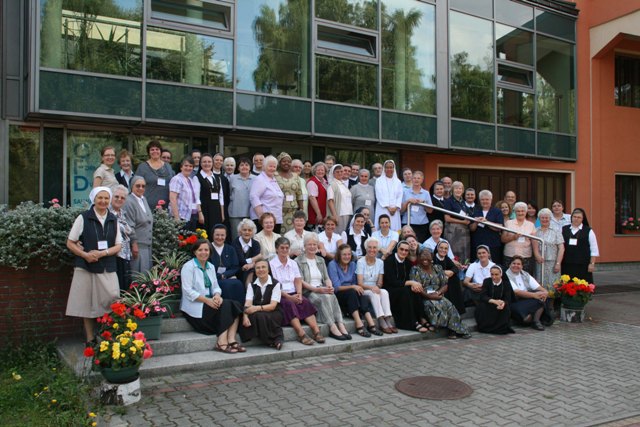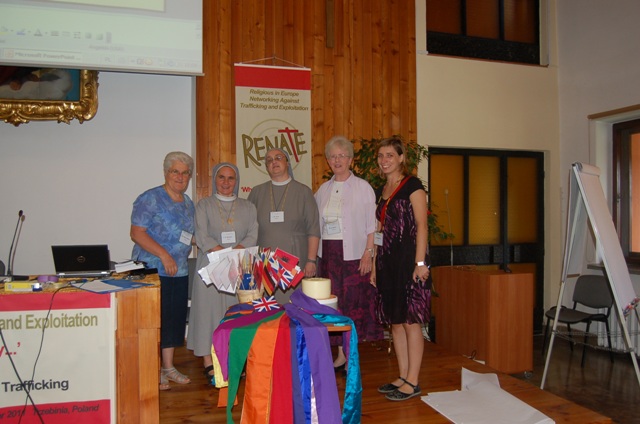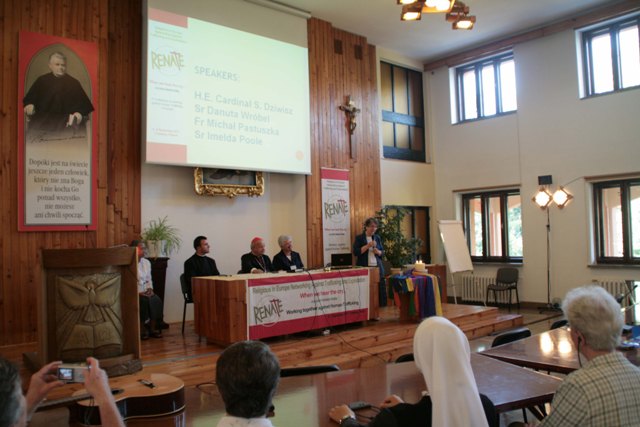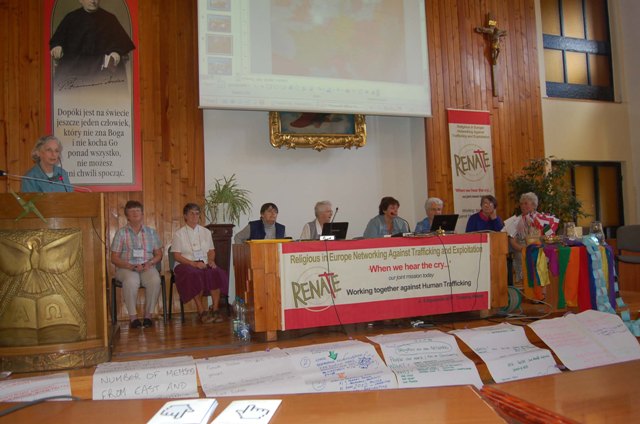When we hear the cry... What do we do when we hear a cry? Normally we check the reason for this cry. If the cry is loud it cannot be missed. However, there are many people in need who will not, or cannot, cry out. One reason may be that they are too frightened to do so; another that they are too ashamed to draw attention to their plight. This is often the case with women forced into prostitution by human traffickers.
| RENATE – 1st International Conference |
(Religious in Europe Networking Against Trafficking and Exploitation)
When we hear the cry... What do we do when we hear a cry? Normally we check the reason for this cry. If the cry is loud it cannot be missed. However, there are many people in need who will not, or cannot, cry out. One reason may be that they are too frightened to do so; another that they are too ashamed to draw attention to their plight. This is often the case with women forced into prostitution by human traffickers. RENATE, the network of women religious committed to working together against human trafficking and exploitation in Europe, organised a Conference on this theme.
The meeting took place in the Salvatorian retreat Centre in Trzebinia near
Those invited were already committed to the work of countering human trafficking and to helping survivors. A number of beginners willing to get involved in this work were also present. I was one of the 6 members of the Irish organisation, APT (Act to Prevent Trafficking), participating. Two members of APT formed part of the steering committee that prepared the Conference.
The programme was designed for sharing and exchanging experiences and coordinating our work into the future. Each day began with the Eucharist celebrated in the chapel of the centre. A liturgy team had prepared a week-long ritual of reconciliation, Scripture readings and responses leading to the kneading and breaking of bread from the wheat of many countries. It took place in the main assembly hall each morning.
Two keynote speakers were invited: Ian Linden, Director of Policy of the Tony Blair Faith Foundation and British feminist theologian, Mary Grey.
Ian Linden‘s input, Human Rights and Human Trafficking, together with the responses raised the following questions and points for discussion:
Ø How can we encourage the victims to speak out about their experiences?
Ø What might be some recommendations for prevention work with women against trafficking?
Ø The victims do not often consider themselves as victims but as the guilty ones. What are some strategies to deal with this?
Ø How do we get men religious to work with this problem?
Ø Are we at the cutting edge or are we just clearing up the mess left by the traffickers?
Ø We are a small Church in a big world. We used to be a big Church in a small world. Has the Church still got a prophetic voice in this field of work? If so, where is it heard?
Ø The driving engine is demand. How do we conscientise both men and women to work against it?
Mary Grey‘s input entitled Created for dignity and well-being, dwelt on the theology and spirituality of response to the issues around trafficking of women. Her key concept introduced the group to the spirituality of sumud – an Arabic word meaning steadfastness, perseverance.
In discussion, issues arose relating to some further questions:
Ø How do we discover/share the greater wisdom amongst us when we work together?
Ø How do we listen to alternative points of view/ different theologies; different languages; different cultures, when we know the most important thing in our ministry is to show the women their dignity?
There were two presentations of a ‘hands-on’ experience of running shelters for victims of human trafficking, the first located in
Seven topics for workshops included: Law and Trafficking, Women‘s Rights for Freedom, Justice and to Speak their Truth, Legalising Prostitution Means Legalising Violence Against Women, Lobbying, Demand, The Prophetic Role of Women Religious in Counter Trafficking and Catholic Social Teaching. It was only possible for each participant to attend one workshop due to time constraints but the main points from the inputs and discussions were posted for all to read leading to further interaction and further issues being raised. Another intervention by In Via,
Two field trips offered half way through the programme enabled participants to touch a grassroots reality by choosing to visit either a shelter for trafficked victims and a boarding school for girls in trouble or
As a result of all this listening, discussion and reflection the following proposals for RENATE surfaced:
Ø The conference is recognised as providing a resource for the sharing of materials, information and training;
Ø The next steering group is to include equal numbers of members from Eastern and
Ø Links with UCESM (European Conference of Religious) to be made;
Ø The website is to be translated into more languages;
Ø RENATE to lead the global Olympic campaign (2012) for UISG (Union of Major religious Superiors);
Ø Training in social communication for the members to be introduced;
Ø Training in fund-raising for members to be introduced;
Ø Ongoing commitment of all to the annual joint campaign for European Day against Trafficking, October 18th;
Ø A commitment has been made to work together into the future.
It is worth mentioning here that RENATE was only established on a legal footing with financial underpinning in 2010. It started with 15 members. A steering committee of six was formed and given a mandate to plan a conference for 2011 to launch the network. The conference was financed entirely by donations from a variety of sources such as religious congregations and other corporate bodies. Some congregations are committed to ongoing financial support.
The mission of RENATE is evolving. It has made a commitment to work not only with the victims but to study the roots of the problem and to forward its mission in the light of all the insights gained during those four days. Being of one voice, one heart and one passion enables the group to work not only in solidarity but also to think together strategically.
At the end of the conference we were all given a memory stick with the main talks, discussion reports and even the press releases sent out by the communications person. It was practically a paperless meeting. And, of course, we had a party on the last night, and what a party, with typical Polish food and drink and a quartet of musicians to set us all dancing with abandon.
The above is mainly an account of the working and programme of the conference. But there was more to it. There was an extraordinary atmosphere of communion generated by the commitment and sense of urgency of all those involved in this work of combating human trafficking. It was also fascinating to get such a clear insight also into the workings of a network. By definition, a network has no structures, no base and no chiefs. The mandate of the Steering Committee that organised this conference finished with the conference. Most of their work was done via email and Skype. When they had to meet on a couple of occasions they were given hospitality by the SRTV (the Dutch Religious Foundation against Trafficking), in one of their convents. The various tasks were apportioned and efficiently carried out. Those of us who were at the receiving end could only marvel at how smoothly everything ran.
A new Steering Committee with equal members from East and
Síle McGowan
Clane Community




